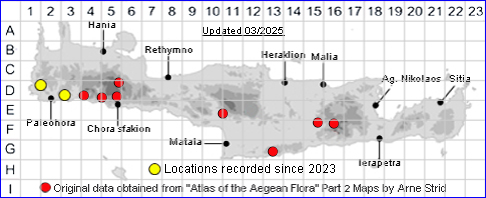
SPECIES DESCRIPTION
CAMPANULA JACQUINII
Family and Genus:- See- CAMPANULACEAE
Common Names:- None
Homotypic Synonyms:- Diosphaera jacquinii, Phyteuma jacquinii, Trachelium
jacquinii.
Meaning:- Campanula (L) Bell-like.
Jacquinii (L) For Nikolaus Joseph Freiherr von Jacquin (1727-1817), a
prominent Austrian botanist.
General description:- Hairless (glabrous) or shortly hairy perennial with a rather
stout, knotty, brittle woody stock.
Stems:-
1) 10-20 cm, flowering numerous, slender, ascending to erect, usually simple.
densely leafy.
Leaves:-
1) 2.5-5 cm, elliptical, margins serrate, subcoriaceous, mostly sessile.
Flowers:-
1) In a dense, terminal corymb.
2) Corolla, c. 10 mm.
a) tube, c. 5 mm, narrow, equalling the linear lobes, bluish-lilac.
3) Style, exserted.
Fruit:-
1) Capsule, ovoid-turbinate.
Key features:-
1) Perennia,l with a woody stock.
2) Corolla, c. 10 mm, with a narrow tube equalling the linear lobes.
3) Style exserted.
Habitat:- Grows on shady cliffs and steep, rocky banks, on limestone, 1200-1900
m.
Distribution:- Endemic mainly to the three main massifs of Crete. Rare.
Flowering time:- June-Sept.
Photos by:- Andreas Loukakis
Status:-
Conservation status (for threatened species): Rare (R) according to IUCN 1997
Protection status (for threatened species): Greek Presidential Decree 67/1981
